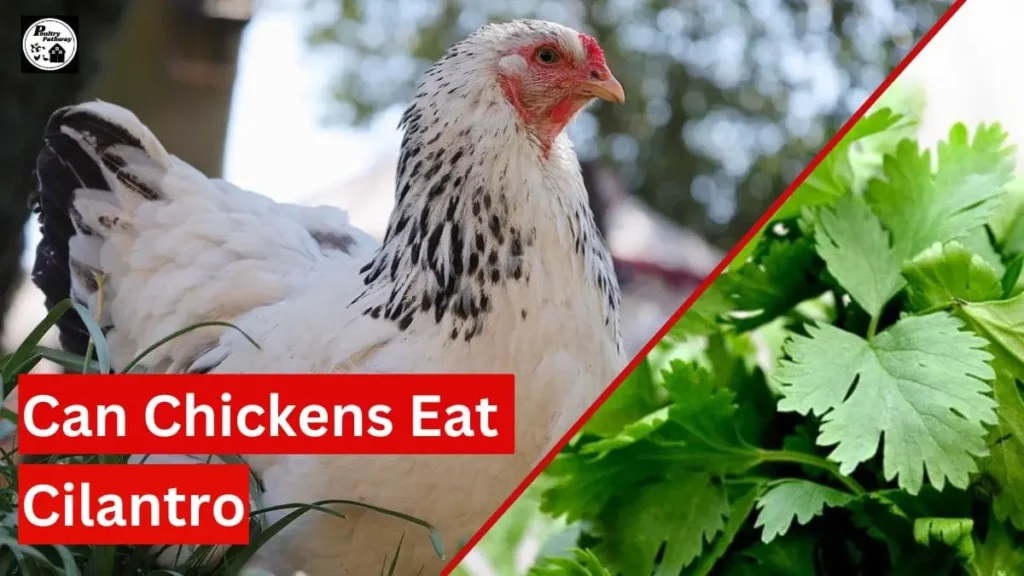Nutritional Value of Cilantro
Cilantro is packed with essential nutrients that can contribute to the overall health of chickens. Cilantro contains a variety of vitamins and minerals that support bodily functions and promote well-being. Some of the key nutrients found in cilantro include:
Vitamins A, C, and K: Vitamin A supports healthy vision and skin, while vitamin C acts as an antioxidant to protect cells from damage. Vitamin K plays a role in blood clotting and bone health.
Antioxidants: Cilantro is rich in antioxidants that help reduce inflammation and protect chickens’ cells from oxidative stress.
Fiber: This herb contains dietary fiber, which aids in digestion and promotes a healthy gut in chickens.
Minerals (Calcium, Potassium, Magnesium): Cilantro provides essential minerals that contribute to bone strength, muscle function, and overall energy balance.
Health Benefits of Cilantro for Chickens
Feeding cilantro to chickens can offer a range of health benefits due to its nutrient-rich profile. Here’s how the key components of cilantro positively impact your flock:
Supports Digestion
The fiber in cilantro helps chickens digest food more easily. It promotes healthy digestion by improving gut function and helping with nutrient absorption, which can lead to overall better health.
Boosts Immunity
Cilantro contains antioxidants, especially vitamin C, which helps support the immune system. These antioxidants reduce inflammation and protect chickens from illnesses by fighting off harmful free radicals in their bodies.
Strengthens Bones
The calcium and magnesium in cilantro are important for maintaining strong bones in chickens. These minerals are especially beneficial for laying hens, as they require more calcium for healthy eggshell production.
Promotes Eye Health
Cilantro is rich in vitamin A, which helps keep chickens’ eyes healthy. Vitamin A supports good vision and prevents eye problems that can occur due to deficiency.
Aids Detoxification
Cilantro has natural detoxifying properties, helping to remove toxins from the body. This supports the liver function of chickens.
Safe Ways to Feed Cilantro to Chickens
To ensure your chickens enjoy cilantro safely, here are some tips on how to incorporate it into their diet:
Start Small: When introducing cilantro to your chickens for the first time, start with a small amount. This helps them get used to the new flavor without upsetting their stomachs.
Chop It Up: Cutting cilantro into smaller pieces can make it easier for chickens to eat. They may be more likely to try it if it’s not in big leaves.
Feed as a Treat: Consider offering cilantro as an occasional treat rather than a daily food. A few leaves a couple of times a week can be a nice addition without overdoing it.
Monitor Their Response: After feeding cilantro, watch how your chickens react. If they seem to enjoy it and show no signs of digestive issues, you can continue to offer it.
Concerns About Feeding Cilantro to Chickens
While cilantro is generally safe for chickens, there are a few things to keep in mind to avoid any potential issues:
Too Much Can Upset Their Stomach: If chickens eat too much cilantro, they might get an upset stomach or diarrhea. It’s best to give cilantro in small amounts.
Imbalanced Diet: If chickens eat too much cilantro and not enough other foods, they might miss out on important nutrients. Herbs like cilantro should only be a small part of their diet, with a variety of other foods to keep them healthy.
Possible Allergies: Some chickens might not react well to cilantro, although this is rare. If it’s the first time you’re feeding them cilantro, start with a little and see how they respond.
Pesticide Risk: Store-bought cilantro may have pesticides on it, so be sure to wash it thoroughly before feeding it to your chickens. Growing your own cilantro or choosing organic is a safer option.
Chop It Up: Cutting cilantro into smaller pieces can make it easier for chickens to eat. They may be more likely to try it if it’s not in big leaves.
Summary
Cilantro can be a healthy and enjoyable treat for your chickens when given in moderation. It’s packed with nutrients like vitamins, antioxidants, and minerals that can support digestion, boost immunity, and promote overall well-being. By feeding cilantro safely—whether to adult chickens or chicks—you can offer a variety of nutrients while keeping your flock healthy and happy.
FAQs
Can Chickens Eat Cilantro Stems?
Yes, chickens can eat cilantro stems. The stems are safe and contain some nutrients, but they are tougher than the leaves. If you’re feeding cilantro stems, it’s a good idea to chop them into smaller pieces to make them easier for your chickens to eat.
Can Chickens Eat Cilantro Seeds?
Chickens can eat cilantro seeds, also known as coriander seeds. These seeds are safe and can be a nutritious treat. However, they should be offered in moderation, as seeds can be high in fat.
Can Baby Chickens Eat Cilantro?
Yes, baby chickens (or chicks) can eat cilantro, but it’s best to wait until they are a few weeks old. Introduce it slowly in small, finely chopped pieces mixed with their regular feed. Monitor their reaction to ensure they tolerate it well.
